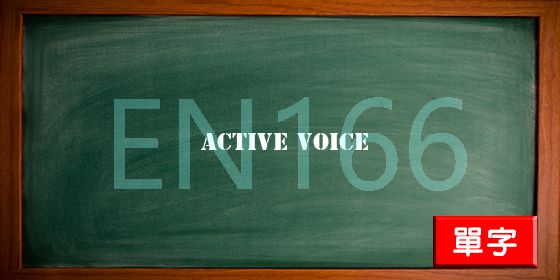active voice 【語法】主動語態。
【語法】主動語態。 “active“ 中文翻譯: adj. 1.活動的,有活動力的;【生物學】活性的;【電 ...“voice“ 中文翻譯: n. 1.語聲;嗓音;鳴聲;〔比喻〕呼聲。 2.發聲力, ...“active and passive voice“ 中文翻譯: 主動與被動語態“and voice“ 中文翻譯: 公開或正式表達出的意見“in voice“ 中文翻譯: 以悲哀的聲調“the voice“ 中文翻譯: 呼聲; 平原綾香; 聲音“the voice that is“ 中文翻譯: 就是這個聲音“voice“ 中文翻譯: n. 1.語聲;嗓音;鳴聲;〔比喻〕呼聲。 2.發聲力,語言(力);想說話的欲望。 3.(學說、主義等的)代言人,表述者,喉舌。 4.(尤指投票時的)愿望,意見,選擇;發言權,投票權,參與權。 5.【語法】語態。 6.【語音】有聲音;聲帶振動;濁音(特性)。 7.【音樂】聲部;歌唱才能,歌喉,嗓子;歌聲;歌手。 8.【電學】口聲。 a chest voice 胸音。 A head voice 頭音。 A deep voice 深沉有力的嗓音。 A veiled voice 嗄啞的語聲。 The voice of the tempter 誘惑。 Indig-nation gave me voice. 氣得我開了口。 My voice is against [for] …我的意見是反對[贊成]…。 A chorus of 100 voices 一百人的大合唱。 At the top of one's voice 用最大的嗓門。 Be in voice 嗓子好。 Find one's voice 開口說,發出聲音。 Find voice in song 借歌發泄[表露]。 Give one's voice for 贊成。 Give voice to 說出,吐露,表現 ( The dog gave voice to his joy. 狗高興得汪汪地叫)。 Have a [no] voice in 對…有[沒有]發言權。 In a hushed voice 低聲私語地。 In a loud voice 用高聲,大聲。 In bad voice 嗓子不好。 In good voice 用嘹亮的聲音,嗓子好。 Lift up one's voice 提高嗓門說話,喧嚷;抗議,訴苦。 Lose one's voice 嗓子啞了,(尤指)倒了嗓子,說不出話來。 Not in voice = out of voice 嗓子不好。 Recover one's voice 開口說起話來。 Speak under one's voice 低聲說。 With one voice 異口同聲,全場一致 ( He was chosen with one voice. 全場一致選了他)。 vt. 1.把…發為聲音,把…發為言語,用話把…說出來,講出。 2.【音樂】調準(風琴管);【語音】把…發成聲音,使發成濁音。 voice opinions 發表意見。 Voice one's discontent 發牢騷,鳴不平。 “voice the“ 中文翻譯: 呼聲“active“ 中文翻譯: adj. 1.活動的,有活動力的;【生物學】活性的;【電學】有功的;【無線電】有源的;【物理學】放射性的。 2.有生氣的,活潑的,靈敏的,敏捷的;主動的,能動的,積極的;有力的,勤勉的;【醫學】有特效的。 3.現行的,活動中的;【軍事】現役的。 an active demand 暢銷。 an active volcano 活火山。 The market is active. 市場活躍。 active measures 積極手段。 on active service 【軍事】現役,現役中的。 take an active part [interest] in 積極參加。 adv. -ly 活躍地;積極地,能動地;【語法】主動地。 n. -ness 活躍,積極性。 “be active in“ 中文翻譯: 對…很積極; 活躍于; 積極參加; 積極于; 在......里活躍; 在……活躍“hoarse voice; husky voice“ 中文翻譯: 啞嗓子“active recall; active recollection“ 中文翻譯: 主動回憶“active-active load balancing“ 中文翻譯: 更可升級為雙主動式負載平衡“a bass voice“ 中文翻譯: 低音的嗓子“a change of voice“ 中文翻譯: 青春期的變嗓音“a clear voice“ 中文翻譯: 朗聲; 清澈的聲音; 清朗的聲音“a falsetto voice“ 中文翻譯: 假嗓音“a familiar voice“ 中文翻譯: 熟悉的聲音“a feeble voice“ 中文翻譯: 聲音細弱“a fine voice“ 中文翻譯: 美妙的嗓音“a gentle voice“ 中文翻譯: 輕柔聲音; 柔和的聲音“a good voice“ 中文翻譯: 一條好嗓子“a gruff voice“ 中文翻譯: 粗重的嗓音“a high voice“ 中文翻譯: 高嗓音
Use cases should be written in the active voice : “ the student indicates the seminar , “ instead of in the passive voice , “ the seminar is indicated by the student . “ furthermore , use cases should be written from the point of view of the actor 應該以主動語態: “學生表明參加研習班意向” ,而不是被動語態“研習班意向被學生表明”來編寫用例。而且,應該從參與者的角度來編寫用例。 |
|
“ birds build nests “ uses the active voice ; “ nests built by birds “ uses the passive voice “鳥筑巢“用主動語態; “被鳥筑的巢“用被動語態 |
|
active weapon |
|
The preordained frangibility of the hymen , the presupposed intangibility of the thing in itself : the incongruity and disproportion between the selfprolonging tension of the thing proposed to be done and the self abbreviating relaxation of the thing done : the fallaciously inferred debility of the female , the muscularity of the male : the variations of ethical codes : the natural grammatical transition by inversion involving no alteration of sense of an aorist preterite proposition parsed as masculine subject , monosyllabic onomatopic transitive verb with direct feminine object from the active voice into its correlative aorist preterite proposition parsed as feminine subject , auxiliary verb and quasimonosyllabic onomatopic past participle with complementary masculine agent in the passive voice : the continued product of seminators by generation : the continual production of semen by distillation : the futility of triumph or protest or vindication : the inanity of extolled virtue : the lethargy of nescient matter : the apathy of the stars 女性之虛弱及男性之強韌乃基于謬誤的臆測。道德的準則是可變的。自然的語法轉換:在不引起意思變動的情況下,由主動語態不定過去式命題從語法上分析:男性主語,單音節擬聲及物動詞,女性直接賓語轉位到相關的被動語態不定過去式命題: 3 ”從語法上分析:女性主語,助動詞與準單音節擬聲過去分詞,男性主動補語。 |
|
The two different modes of thinking - the emphasis on subject consciousness in chinese and on the object one in english - have left clear marks in syntaxes in the two languages : personal pronouns are often used as subjects of the sentences in chinese while nonpersonal ones tend to be their counterparts in english ; active voice seems favorite in chinese structure while there is no such tendency in english 摘要漢語重主體、英語重客體的思維方式在句法中的表現為:在主語的使用方面,漢語傾向用人稱作主語,而英語更多地表現為用物稱作主語;在語態的使用方面,漢語多以主動態代替被動態,而英語則主動態、被動態兼而有之。 |
|
Use cases should be written in the active voice : “ the student indicates the seminar , “ instead of in the passive voice , “ the seminar is indicated by the student . “ furthermore , use cases should be written from the point of view of the actor 應該以主動語態: “學生表明參加研習班意向” ,而不是被動語態“研習班意向被學生表明”來編寫用例。而且,應該從參與者的角度來編寫用例。 |
|
The choice of voices in english is related to many factors , because the alternation between the two voices , passive voice and active voice can change the focus of the sentence , and can influence the coherence or the register of the context 摘要英語語態的選擇涉及多方面的因素,因為語態的變換會改變句子的語義中心、影響上下文的銜接或語域等。 |
|
In both english and chinese , there are middles , which are different from sentences with either active voice or passive voice 摘要英、漢兩種語言中都存在中動結構,一種既區別于主動句又不同于被動句的語言現象。 |
|
Most of the time , you ll want to write in active voice since the doer is usually the important thing 大多數時候,你需要用到主動語態,因為要強調的是施動者。 |
|
Active voice stresses the doer ; passive voice stresses the getter . which one should you stress 主動語態強調施動者,被動語態強調受動者。你要強調的是什么 |
|
In active voice , the doer is the subject ; in passive voice , the getter is the subject 在主動語態中,主語是施動者。在被動語態中主語是受動者。 |
|
“ birds build nests “ uses the active voice ; “ nests built by birds “ uses the passive voice “鳥筑巢“用主動語態; “被鳥筑的巢“用被動語態 |
|
Generative analysis of english passive voice expressed by active voice 英語主動表被動結構生成語法研究 |
|
A construction or form in the active voice 主動語態結構,主動語態形式主動語態的結構或形式 |
|
Use the active voice and omit needless words 使用積極的語氣,忽略無用的單詞。 |
|
Whatever interest he might take in the matter from the point of view of sociability, he had no active voice in it . 他想,從友誼的角度看,不論他對這件事有多大興趣,他都沒有發言權。 |

